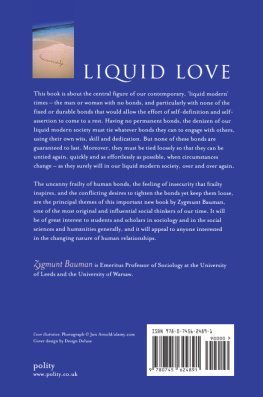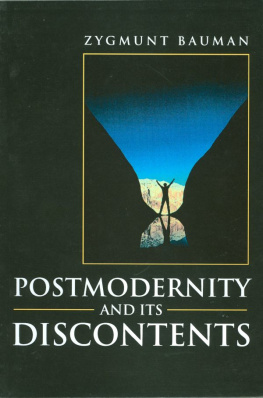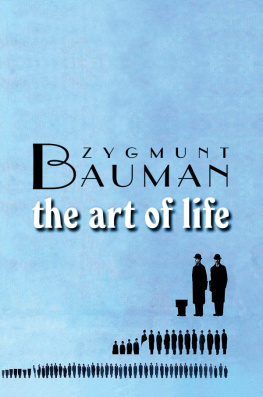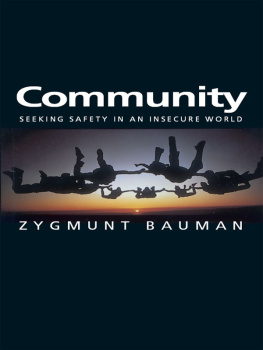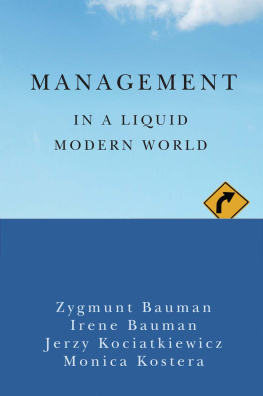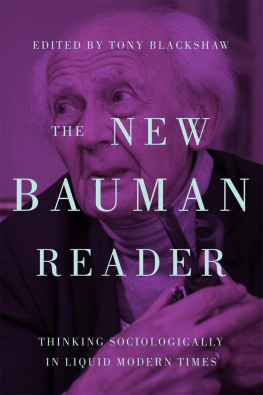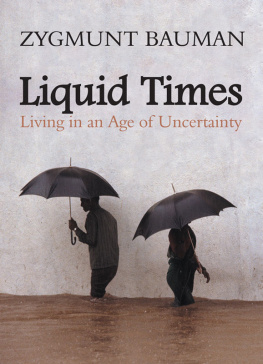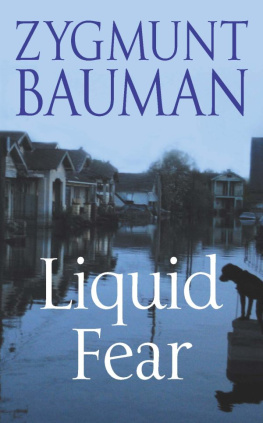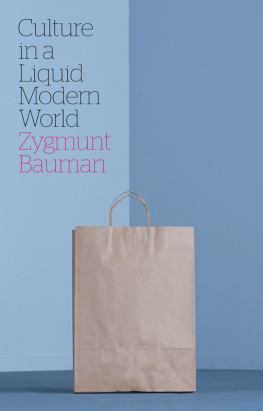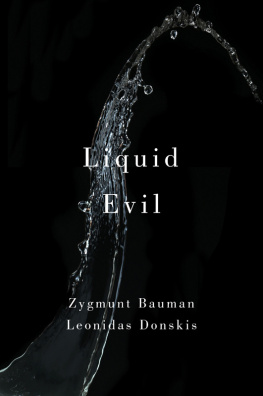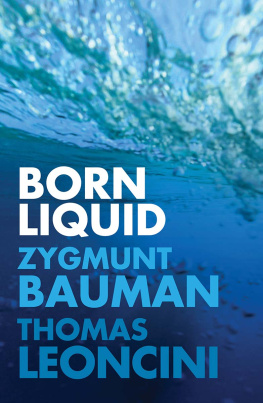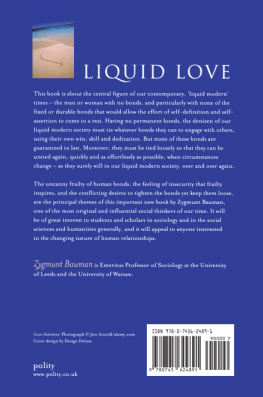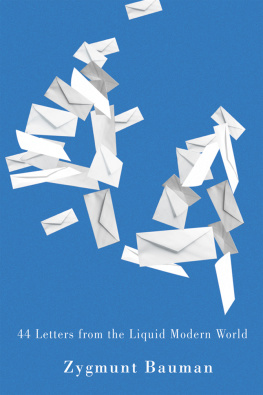Bauman - Liquid love: on the frailty of human bonds
Here you can read online Bauman - Liquid love: on the frailty of human bonds full text of the book (entire story) in english for free. Download pdf and epub, get meaning, cover and reviews about this ebook. City: Cambridge;Malden, year: 2014, publisher: Wiley;Polity Press, genre: Romance novel. Description of the work, (preface) as well as reviews are available. Best literature library LitArk.com created for fans of good reading and offers a wide selection of genres:
Romance novel
Science fiction
Adventure
Detective
Science
History
Home and family
Prose
Art
Politics
Computer
Non-fiction
Religion
Business
Children
Humor
Choose a favorite category and find really read worthwhile books. Enjoy immersion in the world of imagination, feel the emotions of the characters or learn something new for yourself, make an fascinating discovery.
- Book:Liquid love: on the frailty of human bonds
- Author:
- Publisher:Wiley;Polity Press
- Genre:
- Year:2014
- City:Cambridge;Malden
- Rating:4 / 5
- Favourites:Add to favourites
- Your mark:
- 80
- 1
- 2
- 3
- 4
- 5
Liquid love: on the frailty of human bonds: summary, description and annotation
We offer to read an annotation, description, summary or preface (depends on what the author of the book "Liquid love: on the frailty of human bonds" wrote himself). If you haven't found the necessary information about the book — write in the comments, we will try to find it.
Liquid love: on the frailty of human bonds — read online for free the complete book (whole text) full work
Below is the text of the book, divided by pages. System saving the place of the last page read, allows you to conveniently read the book "Liquid love: on the frailty of human bonds" online for free, without having to search again every time where you left off. Put a bookmark, and you can go to the page where you finished reading at any time.
Font size:
Interval:
Bookmark:
Copyright Zygmunt Bauman 2003
The right of Zygmunt Bauman to be identified as Author of this Work has been asserted in accordance with the UK Copyright, Designs and Patents Act 1988.
First published in 2003 by Polity Press in association with Blackwell Publishing Ltd
Reprinted 2003, 2004 (twice), 2005, 2008
Polity Press
65 Bridge Street
Cambridge CB2 1UR, UK
Polity Press
350 Main Street
Maiden, MA 02148, USA
All rights reserved. Except for the quotation of short passages for the purposes of criticism and review, no part of this publication may be reproduced, stored in a retrieval system, or transmitted, in any form or by any means, electronic, mechanical, photocopying, recording or otherwise, without the prior permission of the publisher.
A catalogue record for this book is available from the British Library.
Library of Congress Cataloging-in-Publication Data
Bauman, Zygmunt.
Liquid love : on the frailty of human bonds / Zygmunt Bauman.
p. cm.
Includes index.
ISBN 978-0-7456-2488-4ISBN 978-0-7456-2489-1 (pbk.)
1. Social isolation. 2. Social distance. 3. Interpersonal relations.
4. Intergroup relations. I. Title.
HM1131 .B38 2003
302.545dc21
2002014474
Typeset in 11 on 13 pt Sabon
by Kolam Information Services Pvt. Ltd, Pondicherry, India
Printed and bound in United States by Odyssey Press Inc., Gonic, New Hampshire
For further information on Polity, visit our website: www.polity.co.uk
Ulrich, the hero of Robert Musils great novel, was as the title of the novel announced Der Mann ohne Eigenscbaften: the man without qualities. Having no qualities of his own, whether inherited or acquired once and for all and undetachable, Ulrich had to compose whatever quality he might have wished to have by his own effort, using his own wits and acumen; but none of these qualities were guaranteed to last indefinitely in a world full of confusing signals, prone to change fast and in a way no one expected.
The hero of this book is Der Mann ohne Verwandtschaften the man with no bonds, and particularly no bonds as fixed as the kinship bonds used to be in Ulrichs time. Having no bonds that are unbreakable and attached once and for all, the hero of this book the denizen of our liquid modern society and his successors today must tie together whatever bonds they want to use as a link to engage with the rest of the human world by their own efforts with the help of their own skills and dedication. Unbound, they must connect None of the connections that come to fill the gap left by the absent or mouldy bonds are, however, guaranteed to last. Anyway, they need to be only loosely tied, so that they can be untied again, with little delay, when the settings change as in liquid modernity they surely will, over and over again.
The uncanny frailty of human bonds, the feeling of insecurity that frailty inspires, and the conflicting desires that feeling prompts to tighten the bonds yet keep them loose is what this book tries to unravel, record and grasp.
Lacking Musils sharpness of vision, richness of palette and subtlety of brushstrokes in fact any of his exquisite talents that made Der Mann obne Eigenschaften into the definitive portrait of the modern man I have to confine myself to drafting a portfolio of rough and fragmentary sketches, rather than try a full, let alone the definitive likeness. The most I can hope for is an identity kit, a composite picture that may contain as many gaps and blank spots as filled-up sections. Even that final composition, though, will be an unfinished task, left to the readers to complete.
The principal hero of this book is human relationship. This books central characters are men and women, our contemporaries, despairing at being abandoned to their own wits and feeling easily disposable, yearning for the security of togetherness and for a helping hand to count on in a moment of trouble, and so desperate to relate; yet wary of the state of being related and particularly of being related for good, not to mention forever since they fear that such a state may bring burdens and cause strains they neither feel able nor are willing to bear, and so may severely limit the freedom they need yes, your guess is right to relate
In our world of rampant individualization relationships are mixed blessings. They vacillate between sweet dream and a nightmare, and there is no telling when one turns into the other. Most of the time the two avatars cohabit though at different levels of consciousness. In a liquid modern setting of life, relationships are perhaps the most common, acute, deeply felt and troublesome incarnations of ambivalence. This is, we may argue, why they are firmly placed at the very heart of the attention of liquid modern individuals-by-decree and perched at the top of their life agenda.
Relationship is these days the hottest talk of the town and ostensibly the sole game in town worth playing, despite its notorious risks. Some sociologists, used to composing theories out of questionnaire statistics and the commonsensical beliefs such statistics record, hurry to conclude that their contemporaries are all out for friendships, bonds, togetherness, community. In fact, however (as if following Martin Heideggers rule that things reveal themselves to consciousness only through the frustration they cause going bust, disappearing, behaving out of character or otherwise belying their nature), human attention tends nowadays to be focused on the satisfactions that relationships are hoped to bring precisely because somehow they have not been found fully and truly satisfactory; and if they do satisfy, the price of the satisfaction they bring has often been found to be excessive and unacceptable. In their famous experiment, Miller and Dollard saw their laboratory rats ascending the peak of excitement and agitation when the adiance equalled the abiance that is, when the threat of electric shock and the promise of tasty food were finely balanced
No wonder that relationships are one of the main engines of the present-day counselling boom. The complexity is too dense, too stubborn and too difficult to unpack or unravel for individuals to do the job unassisted. The agitation of Miller and Dollards rats all too often collapsed into a paralysis of action. An inability to choose between attraction and repulsion, between hopes and fears, rebounded as an incapacity to act. Unlike the rats, humans who find themselves in such circumstances may turn for help to the expert counsellors offering their services, for a fee. What they hope to hear from the counsellors is how to square the circle: to eat the cake and have it, to cream off the sweet delights of relationship while omitting its bitter and tougher bits; how to force relationship to empower without disempowering, enable without disabling, fulfilling without burdening
The experts are willing to oblige, confident that the demand for their counsels will never run dry since no amount of counselling could ever make a circle non-circular and thus amenable to being squared Their counsels abound, though more often than not they do little more than raise common practice to the level of common knowledge, and that in turn to the heights of learned, authoritative theory. Grateful recipients of advice browse through relationship columns of glossy monthlies and weeklies and weekly supplements of serious and less serious dailies to hear what they have been wishing to hear from people in the know, since they were too timid or ashamed to aver it in their own name; to pry into the doings and goings on of others like them and draw whatever comfort they can manage to draw from the knowledge endorsed-by-experts that they are not alone in their lonely efforts to cope with the quandary.
Font size:
Interval:
Bookmark:
Similar books «Liquid love: on the frailty of human bonds»
Look at similar books to Liquid love: on the frailty of human bonds. We have selected literature similar in name and meaning in the hope of providing readers with more options to find new, interesting, not yet read works.
Discussion, reviews of the book Liquid love: on the frailty of human bonds and just readers' own opinions. Leave your comments, write what you think about the work, its meaning or the main characters. Specify what exactly you liked and what you didn't like, and why you think so.

